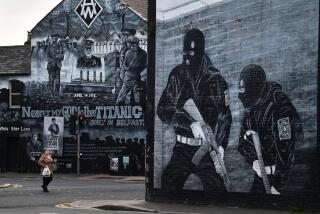Protestants’ Yearly March Stays Peaceful
- Share via
PORTADOWN, Northern Ireland — In a land where religion and intolerance often walk hand in hand, the peaceful march by members of the Protestant Orange Order that took place Sunday was no small feat.
The peace was carefully scripted, to be sure, secured by miles of barbed wire, hundreds of soldiers and police, and a ban on parading through a Roman Catholic neighborhood.
But the Orange Order committed itself to conducting a nonviolent march in the hamlet of Drumcree, and it carried that off against a background of deadly rioting last year and mounting tensions over the latest Northern Ireland peace proposal. Its success could herald a more peaceful Protestant “marching season” in the province than those of recent years.
“We’ve had a year to learn,” said Dave McConnell, 54, a member of the Portadown Orange Order. “You can’t have people being killed and injured in the parades.”
The Drumcree parade is one of the most contentious of the hundreds of Protestant processions that are held throughout the province from Easter Monday to late August in tribute to battlefield victories, particularly King William of Orange’s triumph over the Catholic King James II at the Battle of the Boyne in 1690.
Portadown is a stronghold of the Loyalist Volunteer Force, a Protestant militia that opposes last year’s Good Friday agreement to end the 30-year sectarian conflict in Northern Ireland. Many people feared that Protestant anger over a British-Irish timetable for the creation of a power-sharing government in the province in exchange for Irish Republican Army disarmament could ignite at the Drumcree march.
Instead, the Orangemen--who marched in Sunday suits, bowler hats and orange sashes--emphasized the parade as part of their cultural heritage and insisted that their rights should not be denied. Supporters came to cheer them on.
“The Troubles started 30 years ago over [Catholic] civil rights, but now they’re denying us our rights,” said David Winchester, 35, a window cleaner.
Surveying the military barricades with his 9-year-old daughter and shouting over the noise of army helicopters, he added: “This is like a battlefield. It’s unbelievable . . . like something you see in Vietnam films.”
Catholics call the marchers carrying Protestant banners and raised swords “triumphalist” and consider their anti-Catholic marching songs offensive. They do not believe that the Protestants have a right to march through a Catholic neighborhood without permission from the residents, which the Protestants refused to discuss.
In an attempt to prevent sectarian violence, the independent Parades Commission has rerouted the Drumcree march for the last two years to avoid the predominantly Catholic Garvaghy Road.
Last year, the change led to 10 days of rioting by infuriated Protestants that left one police officer dead and scores of people injured. The violence subsided only after a firebomb was tossed into a Catholic home in Ballymoney, burning to death three young brothers.
This year, several thousand members of Orange lodges marched quietly along the approved route, past the Catholic St. John the Baptist Church, which had been encircled by armored jeeps, Royal Ulster Constabulary officers with police dogs, and a barrier of barbed wire.
As the march played out in Portadown, Protestant leaders of the Ulster Unionist Party in Belfast, Northern Ireland’s capital, faced renewed pressure from London to accept the British-Irish peace deal.
British Prime Minister Tony Blair wrote in London’s Sunday Times that the blueprint he and his Irish counterpart, Bertie Ahern, had put forward two days before “offers unionists every key demand they have made since partition 80 years ago.”
The proposal calls for the creation of an executive that would include members of Sinn Fein, the IRA’s political wing, by July 15. The IRA would begin to disarm within weeks and finish by May 2000.
More to Read
Sign up for Essential California
The most important California stories and recommendations in your inbox every morning.
You may occasionally receive promotional content from the Los Angeles Times.













